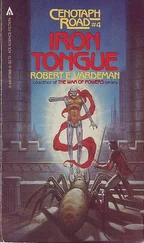Jones had always prided himself on being a sophisticated and reasonable man, and on being free of the primitive emotion of prejudice. Watching the threedies of the anti-linguist riots, he had marveled that man could so turn against his own kind and could excuse such brutality for a reason that was no reason. Once, for the color of a man’s skin. Now, for whether a man came out of the households of thirteen families of this world — out of the Lines. He had watched and felt contempt, thankful that he could not be like that, pleased that no such baseness tainted him .
His stomach twisted, now; sick, he realized that the hate he felt for the elegant man who sat there mocking them — hate that rolled through him as he had once seen pus roll from a wound — was prejudice! He hated this man with an entirely irrational blood lust. He would have taken pleasure in thumbing out his eyes. For a few words, and no doubt a few gestures. He’d been warned that a linguist could control you with gestures and you’d never suspect, when he was in training. “With the tip of their little finger, men!” the instructors used to snap at them. “With nothing more than the way they breathe , they can control you!” He’d learned that for the exams, he’d learned all kinds of crap for exams, but he hadn’t believed it. He believed it now. Because it couldn’t have been the words that Chornyak was using. Shit, he’d read those words in a hundred right-wing magazines, heard them in a hundred bars when tempers were running high, it was what anybody at all would have said in an off-guard moment, it could not be the words… No, the man had done something to his mind, he’d gotten at him somehow… with the tip of his little finger. With the way he breathed.
It did not occur to Jones that one way to avoid some of this, although it wouldn’t save you from what linguists could do with the modulations of their voices, was not to look at the linguist while he talked. He stared at him, as fascinated as a snake in a basket. Smith, on the other hand, looked at the ceiling when he wasn’t speaking directly to Chornyak and looked a little past him when he was, and he knew that Jones had been told to do the same. Jones hadn’t learned it, because he hadn’t believed it mattered.
“Mr. Chornyak,” said Smith, “we know how you feel, and you know how we feel, and it’s all very cosy. The question is not how we feel about this — nobody likes it, whatever you may think — but what the linguists will do.”
Thomas sighed and shook his head slowly.
“What can we do?” he asked. “I can imagine the reaction I’d get if I called the FBI and reported that a government agent had kidnapped one of our babies. We are as helpless in the face of government barbarism as any other citizen, Mr. Smith, and we will do what any other citizen does. We will go through the motions. Call the police, report the baby missing, pretend for the sake of its parents that a search is being made… And then we will comfort the mother in her grief as best we can.”
“You don’t know — ”
“I do know. The baby will die, as all the other babies die. Or it will be mutilated so horribly that it will have to be put to death in the name of decency, as has also happened. And we will comfort the mother in her grief, as best we can.”
Thomas knew precisely what Smith was thinking. Why, Chornyak, he was thinking, don’t you threaten us with what you really can do, and with what every one of us knows you really can do? Why don’t you threaten to pull out the linguists, every last one of them, and plunge the world into chaos? Why do you pretend that you are just a citizen like any other citizen?
Well… let him wonder. Thomas had no intention of telling. Nobody knew, or would ever know, except when time came to pass on the leadership of the Lines. Then he would have to explain to the next Head that that trump card was being held for one situation — for the time when the government, after murdering who knew how many hundreds or thousands of innocents in their Interfaces, finally stumbled upon that unique non-humanoid species whose perceptions could be tolerated by humans. On that day, which might be ten thousand years away, or ten days, the government would suddenly decide that it was in the Interfacing business and could do the job of acquiring Alien languages on its own. And it was then that the government would hear the linguists’ terms: either the Lines kept that part of the Interface industry as they had all the rest, or every linguist involved in negotiation, no matter how crucial, would walk out and participate no more. It was not the intention of the linguists to see their own offspring wasted in this random search for the chance species that would break the perceptual barrier between humanoid and non-humanoid; on the other hand, it was not the intention of the linguists to see their power lost to the government or the public.
Governments, and people in general, were likely to take power and do damn fool things with it, like carrying on nuclear wars and cutting each other up with chain saws and laser scalpels. The linguists had a way to curb some of that, an awesome power for all its limitations, and they would keep it in the Lines where it would never be subject to the follies of bureaucrats or simple ignorance.
Thomas had a responsibility, and sometimes it was unpleasant. Sometimes, when he listened to the very little boys in the Household complaining that they didn’t understand why they had to do without everything just because stupid people thought linguists made too much money, and how they thought it was sucking up to go on like that… sometimes he was tempted.
He remembered when he’d been a little boy like that himself. It was during one of the times when energy was wasted, inexcusably — a time of government “market adjustment.” There had been a kind of portable force field that whirled around the outside of the body and could be set to keep the temperature within a certain range. It let you do away with winter clothing, and it made it possible to wear ordinary clothing in summer with total comfort. It hadn’t lasted, because even the rich who loved such toys quickly found such squandering of resources intolerable. But while it was available, the children had had a good time. They had discovered that if you got a few of these fields whirling at top heat setting and a few others at maximum cold, you could get a baby tornado going in the middle of the circle of children, and you could watch it suck up leaves and grass, and if you were daring you could stick your finger into its center where everything was totally still.
Thomas had stood there, six years old and bundled in a plain cloth coat, stamping his feet against the cold and rubbing his frozen fingers together. The other children were in a little park that he had to pass on his way to and from school, and they were blissfully comfortable in that cold in light shorts and shifts — except for the ones who were providing the maximum cold settings, of course. They were cold like Thomas, colder even. But they were having fun. He would never forget how he had watched and longed to play that game, wanted to have a baby tornado to play with, wanted to be part of that circle… he’d gotten chilblains, standing there. And no sympathy.
“You’re a little fool, Thomas,” they’d said to him at home. “Linguists can’t have such stuff, and you know it, and you know why. You’ve been told a thousand times. People hate us, and we do not choose to feed that hate for trivia. People believe that we are greedy, that we are paid millions of credits to do things that anybody could do if we’d only tell them how — we do not choose to feed that perception, either. Now go study your verbs, Thomas, and stop whining.”
Читать дальше












